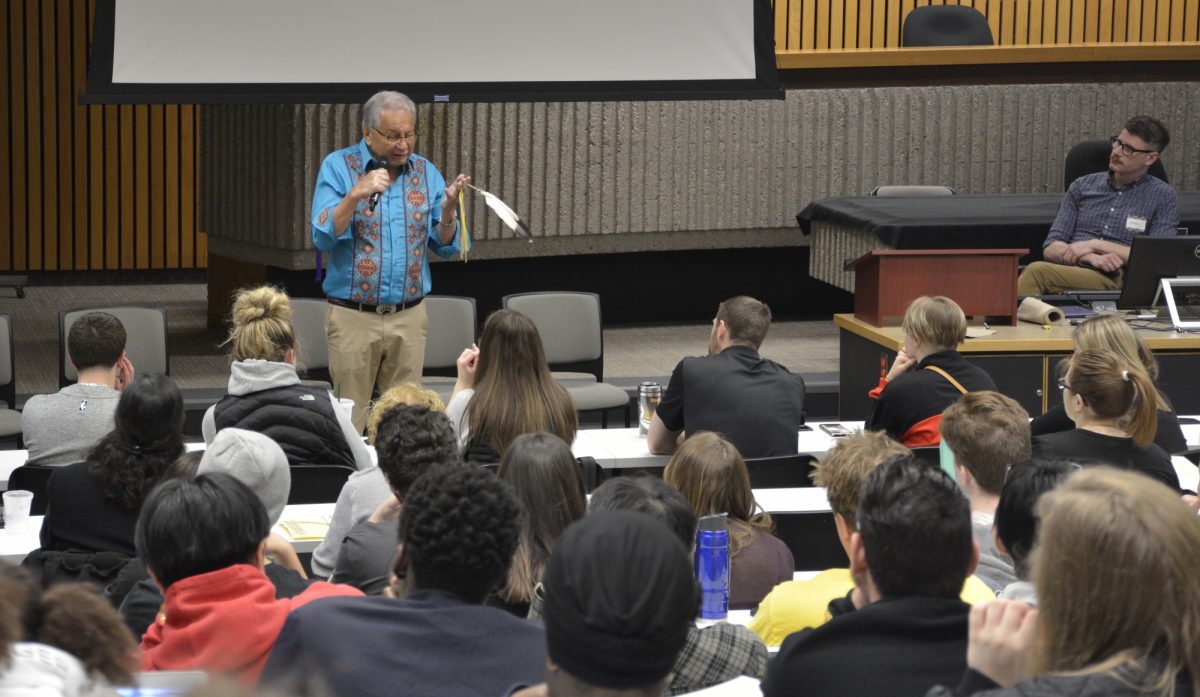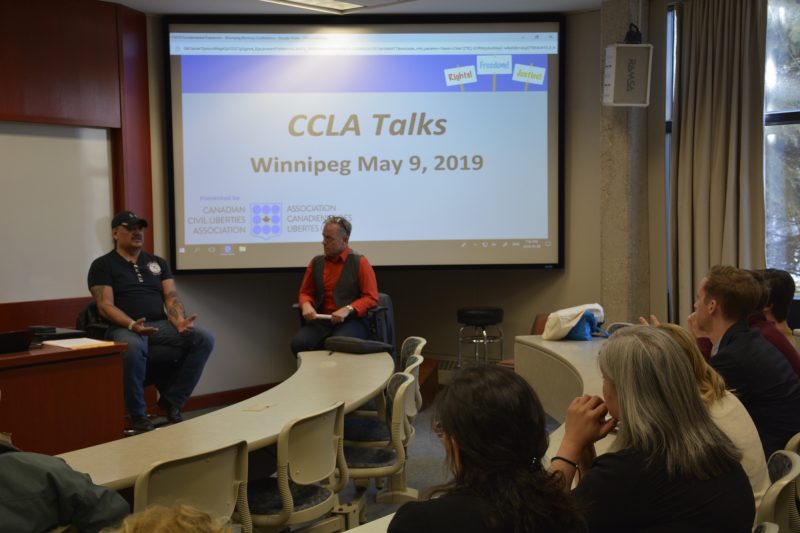
Keynote Speaker Anishnaabe Elder Fred Kelly, speaks to Winnipeg High School Students at the CCLA Borovoy Conference.
Canadian Civil Liberties Association and law students teach Manitoba high schoolers, community members about civil rights
Robson Hall’s law students have been increasing outreach to high school students to encourage them to learn about their civil rights and the Canadian legal system. For the first time, the Manitoba Law Students’ Association Outreach Committee collaborated this year with the Canadian Civil Liberties Association(CCLA) to host a CCLA Borovoy Conference on May 9that Robson Hall for grade 11 and 12 students to learn about their rights and freedoms.
After the conference, CCLA hosted a “CCLA Talks” evening event open to the general public, featuring a conversation between CCLA Executive Director Michael Bryant and Winnipeg’s Bear Clan Patrol Executive Director, James Favel.
“It was a pleasure to partner with Robson Hall to present the first Winnipeg edition of the CCLA’s Borovoy Conference for youth,” said Bryant.
CCLA staff said that 150 students from across Winnipeg were invited to spend the day in dialogue with legal experts and social activists, enabling them to see themselves as positive change makers. Attendees were a smart, engaged group of young people, with important perspectives on rights and equality in Winnipeg. “We were very pleased to then have James Favel highlight The Bear Clan Patrol’s important work in our ‘CCLA Talks’ event in the evening,” said Bryant. “The CCLA’s collaboration with the law school developed out of the COC’s use of our education materials in CanU programming, and the COC law students were amazing partners. We look forward to returning to the law school to present future Borovoy Conferences.”
The students helping to organize the conference learned a lot from the experience. “It is important that the public is educated about their rights and freedoms, recognizes when there is potentially an infringement…and has knowledge as to what they can do,” said Outreach Committee Chair, Samantha Gergely, who graduates from the J.D. program this spring. “The Borovoy Conference on Fundamental Rights and Freedoms provided a platform for those conversations to take place.”
Daniel Reimer who graduated in 2018 and articled at Manitoba Public Insurance, came back to help organize the conference, having been a member of the Outreach Committee, and CanU Law Coordinator in his final year of law school.
“All youth have the capacity for advocacy,” said Reimer, “and events like the Borovoy conference consistently demonstrate that there is a real hunger among Winnipeg’s youth to engage with their civil liberties. Creating an environment for that engagement, where youth can express their beliefs, advocate for their ideas and wrestle with opposing opinions, is critical in feeding that hunger and inspiring young advocates. I feel honoured to have been a part of the 2019 Borovoy conference, and I look forward to future collaborations with the CCLA here in Winnipeg.”
The CCLA has brought Borovoy conferences to youth for over 20 years. Named after former CCLA General Counsel Alan Borovoy, the conferences help students to understand balancing competing rights, countering injustice and advocating strategies.
Michael Bryant, Executive Director and General Counsel for the CCLA first welcomed the students, explaining the CCLA mandate to fight for human rights and democratic freedoms of everyone. Keynote Speaker Anishnaabe Elder Fred Kelly, residential school survivor and member of the team that negotiated the Residential Schools Settlement Agreement, and an old friend of the late Mr. Borovoy spoke of his involvement in the early Civil Rights movement in Canada in the 1960s.
Other guest speakers who led workshops throughout the day included Adikheir Ahmed, Director of Immigration Partnership Winnipeg, Noa Mendelsohn Aviv, Director of Equality Program at the CCLA, and Jordyn Sheldon, Education Coordinator at MARL. A workshop on the Criminalization of Indigenous People included speakers Chantelle Barker, Director of Justice and Law, and First Nation Justice Strategy, and Joanna White, Community Justice Development Coordinator, both from The Southern Chiefs Organizations Inc.
Gergely observed that during the workshops, “the students were challenged to think about their rights and freedoms in different contexts such as freedom of expression and hate speech, privacy rights, LGBTQ+ rights, refugee and immigration rights, criminalization of Indigenous peoples, conflict of freedoms, religious freedoms and youth activism. The critical connection occurred when the students recognized that potentially in some way or circumstance their rights or freedoms were being infringed and why such an action or circumstance gave rise to an infringement.”
While in Winnipeg, the CCLA also worked with Ryerson Elementary Schools’ grades 5 and 6 Social Action Club students over the course of the week to develop student-led change projects. Culminating in student presentations on Friday at the law school, students choose issues including clean drinking water for northern communities, gender non-specific washrooms in Winnipeg schools, animal rights, and freedom of religion.
That evening, Bryant sat down with James Favel, Executive Director of Winnipeg’s Bear Clan Patrol, to discuss how the Patrol has been able to develop ways to work with the police to find a community-based solution to crime prevention. Rather than being in conflict with the community, the Patrol seeks to work in harmony with it, in a non-violent, non-threatening, non-judgmental and supportive manner. Favel described the Patrol’s mandate as “to protect the vulnerable people in the community” so as to minimize the need for police. Their focus is on building relationships to build trust and be better able to help people in need. Rather than vetting prospective members for criminal records, they prefer that members have lived experiences. Favel, for example, stated that he himself is a “four times convicted felon.”

James Favel, Executive Director of Winnipeg’s Bear Clan Patrol (left) in conversation with Michael Bryant, Executive Director and General Counsel for the CCLA.
Through much trial and error, Favel said the Patrol has come along way to helping people, citing several stories where he stopped to talk to someone on the street who looked like they may have needed help, and as a result, ended up saving a life or stopping a bad situation from becoming worse. Where the police at first did not want any involvement with the Bear Clan, Favel said now they are offering to train them and donate their decommissioned radios to the Patrol. Through their increased collaboration with the police, the Patrol has been able to get drug houses and human trafficking trap houses shut down.
Explaining the difference between how the police operate and how the Patrol operated, Favel said, “We don’t chase people – we de-escalate. Calling the police is a last resort.”
A soon-to-be articling student at Justice Canada and Public Prosecution Services Canada, Gergely said she took away some important lessons from attending the evening discussion. “The Bear Clan Patrol is actively involved in responding to various communities’ needs and ultimately aiming to provide restoration and maintenance of harmony within the community.”
Bryant, in discussion with Favel, observed that “the number one problem in the community is not addiction, it’s poverty.” Having a criminal record makes it very hard to get a job, which contributes to individuals being unable to escape from poverty. The Bear Clan, Favel explained, is “trying to demonstrate that people can grow and be better after being idiots as kids.”
“This is not rocket science,” he concluded. “It’s just basic community building.”






